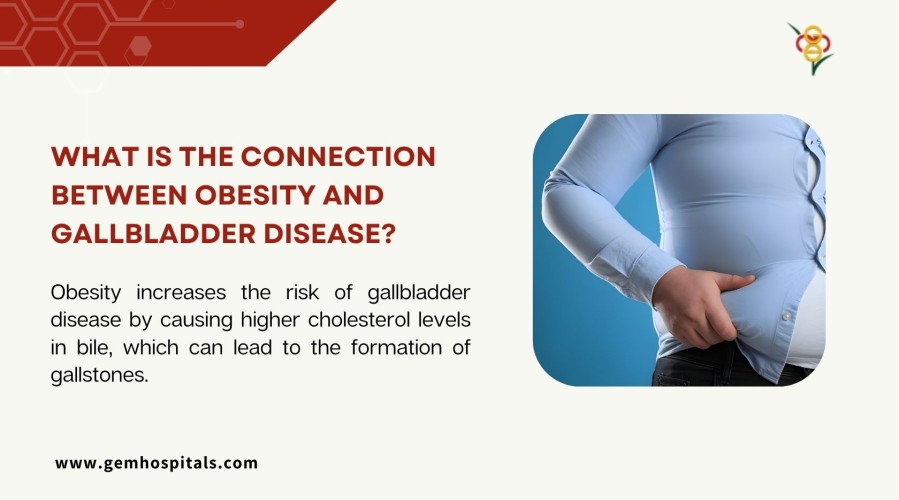Learn effective solutions for digestive problems with expert tips to improve gut health, reduce discomfort, and maintain a healthy digestive system.
What is the connection between obesity and gallbladder disease?

Obesity is the most common health concern globally, due to certain reasons and lifestyles of this generation of people the prevalence of obesity keeps on increasing. Obesity not only affects the appearance of an individual more than that it can lead to serious health conditions including cardiovascular disease, diabetes, and certain cancers. People may not know this obesity has a close link in the development of gallbladder disease. Gallbladder disease is associated with gallstones and cholecystitis is going to have a greater effect on the people who are overweight or obese. In this case, understanding the linkage between obesity and gallbladder disease is vital and can help you in effective prevention and managing the condition. The content below may help you in knowing about it further,
Understanding gallbladder disease
The gallbladder is a small organ located beneath the liver that stores bile, a digestive fluid produced by the liver. Bile aids in the digestion of fats. Gallbladder disease often arises from issues with bile flow and can manifest in two primary forms, gallstones and cholecystitis (inflammation of the gallbladder). These conditions may require medical intervention, and in severe cases, the gallbladder may need to be surgically removed.
How does obesity impact gallbladder function?
The health of the gallbladder is greatly influenced by obesity and also increases the risk of developing gallbladder disease double the time than normal. The ultimate function of the gallbladder is storing the bile but when they are not functioning well the bile composition will get changed. The bile plays a crucial role in digesting fats.
One of the main connections between obesity and gallbladder disease is the increased production of cholesterol in the liver. In obese individuals, the liver produces more cholesterol, and this excess cholesterol gets secreted into the bile. Bile is normally composed of bile salts, water, and a small amount of cholesterol. However, when the bile becomes saturated with cholesterol, it can form crystals that gradually grow into gallstones.
Another factor that contributes to gallbladder disease in obese individuals is the decreased ability of the gallbladder to contract and release bile properly. In obese people, the gallbladder may empty less efficiently, causing bile to remain in the gallbladder for longer periods. This stagnation promotes the formation of gallstones, as cholesterol has more time to crystallize.
Obesity is also associated with hormonal imbalances, particularly in women. Estrogen, a hormone that regulates many bodily functions, increases the amount of cholesterol in bile. Obese women, particularly those who are postmenopausal or taking hormone replacement therapy, are at a higher risk of developing gallstones due to elevated estrogen levels.
Obesity is often characterized by chronic low-grade inflammation throughout the body. This inflammatory state can affect the gallbladder and bile ducts, increasing the risk of gallbladder disease. Inflammation can also impair the function of the gallbladder, leading to its dysfunction and increased susceptibility to infections or blockages.
Preventing gallbladder disease in obese individuals
Given the strong connection between obesity and gallbladder disease, maintaining a healthy weight is one of the most effective ways to reduce the risk of gallstones and other gallbladder-related issues. Here are some strategies to prevent gallbladder disease in obese individuals, it may include, achieving and maintaining a healthy weight, following a balanced diet, increasing physical activity, and considering medical interventions for high-risk individuals.
The connection between obesity and gallbladder disease is strong, with excess weight the chance of developing gallstones and gallbladder inflammation is increasing. Obesity directly has impacts on gallbladder function that may alter the composition of bile, reduce the motility rate, and also influence hormonal and inflammatory changes. Through gradual weight loss and medical supervision it can be managed so prefer the best doctor who could support you in reducing your excess weight more safely. It also requires proper addressing of obesity reason giving attention to it and preventing future complications.
For early diagnosis or preventive care, consult the specialists at Gem Hospital.
Contact us today for expert guidance and personalized treatment options!
Blogs & Article
Explore current research trends in digestive health, including new treatments, advanced diagnostics, and innovations improving gut health and patient care.
Discover common digestive health myths and the real facts. Learn simple tips to improve gut health and maintain better digestion for a healthier life.


